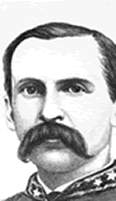
|
|
VITAL STATISTICS
|
BORN: 1835 in Savnanvah, GA.
DIED: 1888 in Savnanvah, GA.
CAMPAIGNS: Atlanta, March to the Sea and Carolinas.
HIGHEST RANK ACHIEVED: Brigadier General.
|
|
BIOGRAPHY
|
| Robert Houston Anderson was born in Savannah, Georgia, on October 1, 1835. Graduating from West Point in 1857, he served at a garrison in New York State and at Fort Walla Walla in the Washington Territory as a lieutenant of infantry. Anderson accepted a commission as a lieutenant of artillery in the Confederate army once the secession crisis had begun, being listed as "absent without leave" from the U.S. Army until his resignation was received in 1861. In September of 1861, he was promoted to the rank of major, and took up the administrative position of assistant adjutant general to W. H. T. Walker, major general of Georgia state troops. Before he was transferred to line duty in January 1863, Anderson saw action in coastal Georgia at Fort McAllister. Having been promoted to colonel of the 5th Georgia Cavalry, he was later appointed brigadier general on July 26, 1864. Fighting as a cavalryman in the Army of Tennessee, he served under Major General Joseph Wheeler in the Atlanta Campaign. During one of Wheeler's operations near Franklin, Tennessee, Brig. Gen. John H. Kelly, a division commander, was killed, and Anderson was placed in divisional command temporarily. After the fall of Atlanta, Anderson returned to brigade command and fought through the March to the Sea and the Carolinas Campaign. He was surrendered with the army by Gen. Joseph E. Johnston. After the war, Anderson moved to Savannah and served as the city's chief of police from 1867 to his death on February 8, 1888. |
|